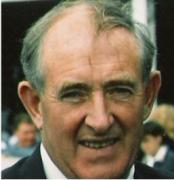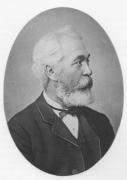|
|
||||||||||||||||||||||||
 |
Featured person
Recently added |
Danny Blanchflower (1926 - 1993): |
||||||||||||||||||||||

|
| Danny Blanchflower |
Robert Dennis Blanchflower, Danny as he was known, was born at Dunraven Park, Bloomfield, Belfast, son of a shipyard worker, and a mother who played football with a factory women's team in Belfast. Blanchflower attended Ravenscroft School where he was awarded a scholarship to Belfast College of Technology. A keen footballer from an early age, in his teens he would sometimes play three times on a Saturday: for the school in the morning, the Boys' Brigade in the afternoon, and a local league team in the evening; by the summer of 1941, he had set up his own football club, Bloomfield United, which competed in the East Belfast Summer League. He left the College prematurely to work as an apprentice electrician at Gallaher's cigarette company in Belfast, and in 1943 joined the Royal Air Force, lying about his age to do so. He spent a period of time in Canada for air force training, and on his return to Belfast in 1946, returned to play with Glentoran, one of the more prominent clubs, having joined them as an amateur in 1942.
Blanchflower's talent was soon spotted by Barnsley FC in England who signed him in 1949. By now his profile as a player was of a right-sided midfielder who could "read" a game very accurately (he had notably accurate anticipation and was quick at intercepting opposition moves), and was also a highly accurate passer of the ball. Also in 1949, on October 1st, he played for Northern Ireland for the first time (he went on to make 56 international appearances). He disagreed with some of the training methods at Barnsley, and 1951 left to join the First Division club Aston Villa. Though he became captain of the team, he disagreed with training methods there as well, principally what he saw as lack of training with footballs. In 1954 he moved to the prominent London club Tottenham Hotspur, where, though he had further disagreements about management of the team, he nevertheless became captain. He also captained the Northern Ireland team at the 1958 World Cup finals in Sweden, where the team drew admiration from round the world, Blanchflower being singled out as seeming to be on both wings of the pitch at once, and making what were called "unerring" passes. This was the first time Northern Ireland had qualified for the finals, and once there qualified for the second phase.
Back in England, Blanchflower was central to the building-up of Tottenham into the first team in the century to win the English League Championship and the FA Cup in one season, 1960-1961, making them the leading team in England, and one much admired for its style of play as well as its success. The following year they won the FA Cup again and the year after that, the European Cup-winners' Cup, the first British team to claim a European trophy. By now though, Blanchflower was missing games through injury, and his age was against him. He last played for Tottenham's first team in November 1963.
In 1964 Blanchflower retired as a player but had already been active in journalism for some years, starting in the early 1950s; he published in various papers including the Birmingham Evening Mail and then, after his move to Tottenham, for the London Evening News. He had also published in The Observer and the New Statesman. He worked for the Sunday Express as a columnist from 1964 until 1988, and also did some commentary for television. He had two spells in management, for the Northern Ireland team from 1976-1978 and Chelsea, another prominent London club; though admired for his shrewd tactical ideas, he was not as successful a manger as he had been a player; he had extremely clear and firm ideas about tactics and training, ideas which he felt were not prevalent enough in the contemporary game.
Blanchflower was twice named Footballer of the year, in 1958 and 1961, on foot of his international and domestic triumphs, and in a survey for The Times in 2009 was ranked as the greatest player in Tottenham Hotspur's history. He was the first footballer to be a guest on the famous BBC programme Desert Island Discs, as well as other programmes as he was far from media shy. His eloquence and humour were reflected in one of his most well-known remarks about footballing tactics: "We aim to equalise before the other team score. We should get our retaliation in first." He also appeared on screen, playing himself, in a 1984 film about the 1961 Tottenham team, "Those Glory, Glory Days", and in several television series.
But his media-friendliness was not entirely universal. In 1961 he created a stir which echoed around the whole country, footballing or otherwise, when he refused to take part in what was then one of the most popular television programmes on British television, “This Is Your Life”. This involved for each episode, presenting the life of a celebrity, from any walk of life, chiefly through the reminiscences family and friends, presented live in the studio, the programme having been kept secret from the subject. Shortly before the live broadcast, the subject would be “ambushed” by the genial moderator Eamonn Andrews brandishing his Big Red Book of photographs. Normally the subjects were either too surprised or too flattered to decline the offer to continue with the broadcast, but Blanchflower not only demurred but flatly refused to participate. Blanchflower later related that when the show’s producer tried to prevent him from leaving the building, he even slipped out of his jacket and rushed an exit which turned out to be locked. Blanchflower nevertheless was adamant and the evening’s show did not, as one might say, go on. Headlines abounded about the incident and according to the London Daily Telegraph the matter was even mentioned in Parliament. Given his usual openness to the media, his explanation was the programme’s coercive tactics: “I felt Shanghai’d” he said.
His health deteriorated in his later middle age from Alzheimer's disease and Parkinson's disease. He died at Woodlands Nursing Home, Rookery Road, Staines, Middlesex, on 9 December 1993, of bronchopneumonia. A memorial service was held in St Anne's Cathedral, Belfast, on 14 February 1994. The park and sports stadium at Sydenham, Belfast is named for him. His brother was the successful but ill-fated Jackie Blanchflower.
| Born: | 10 February 1926 |
| Died: | 9 December 1993 |
| Richard Froggatt |
| Acknowledgements: Wesley McCann |


Home | Our Policies | Plaques | Browse | Search | Sponsors | Links | Help | Contact
Privacy & Disclaimer | Cookie Policy | Site Map | Website Design By K-Point
© 2024 Ulster History Circle









